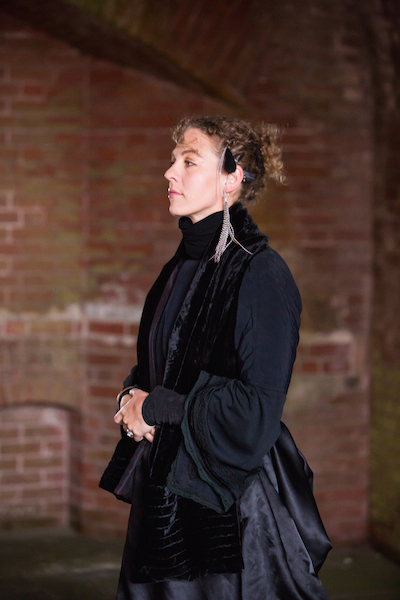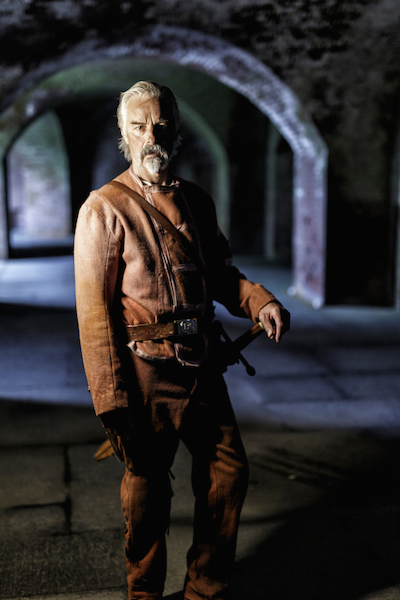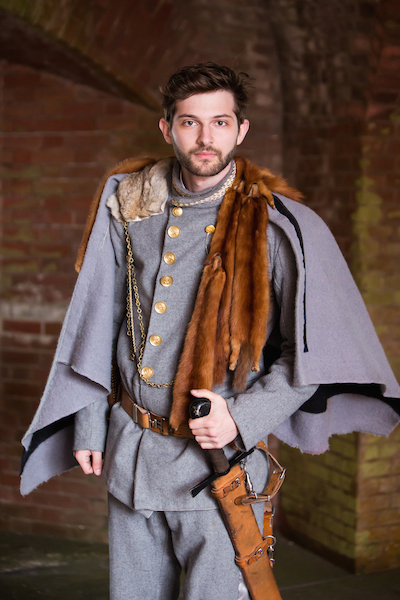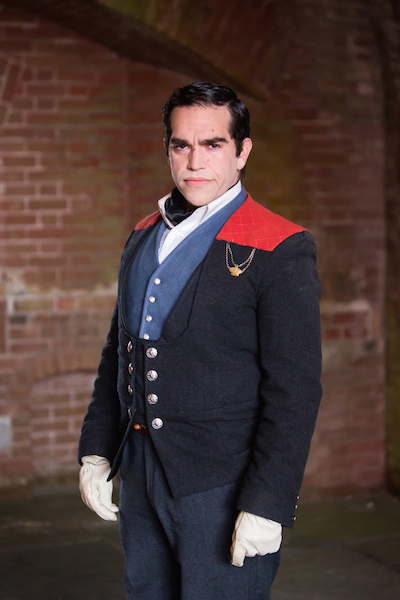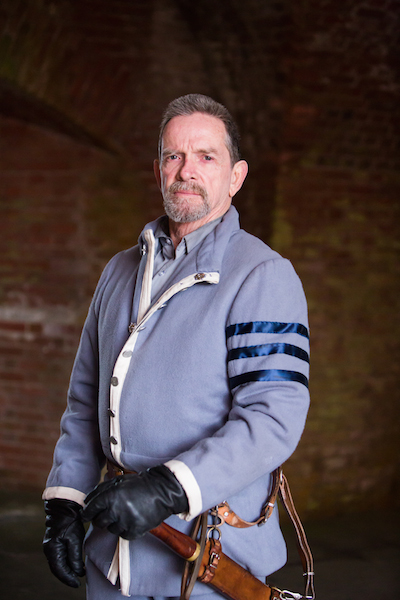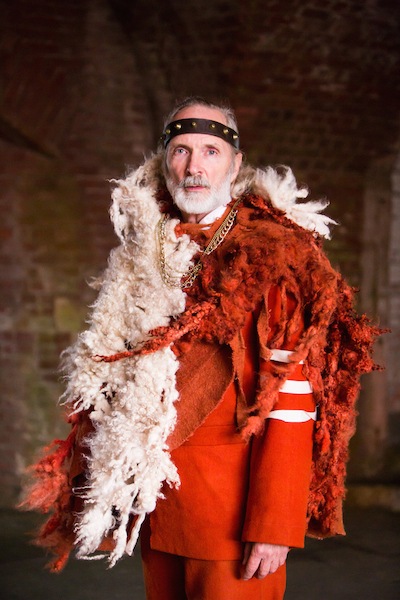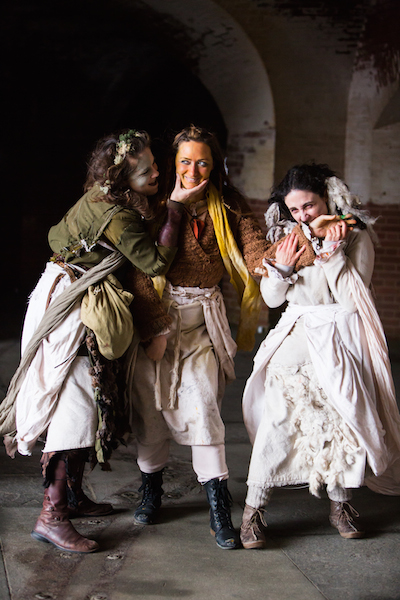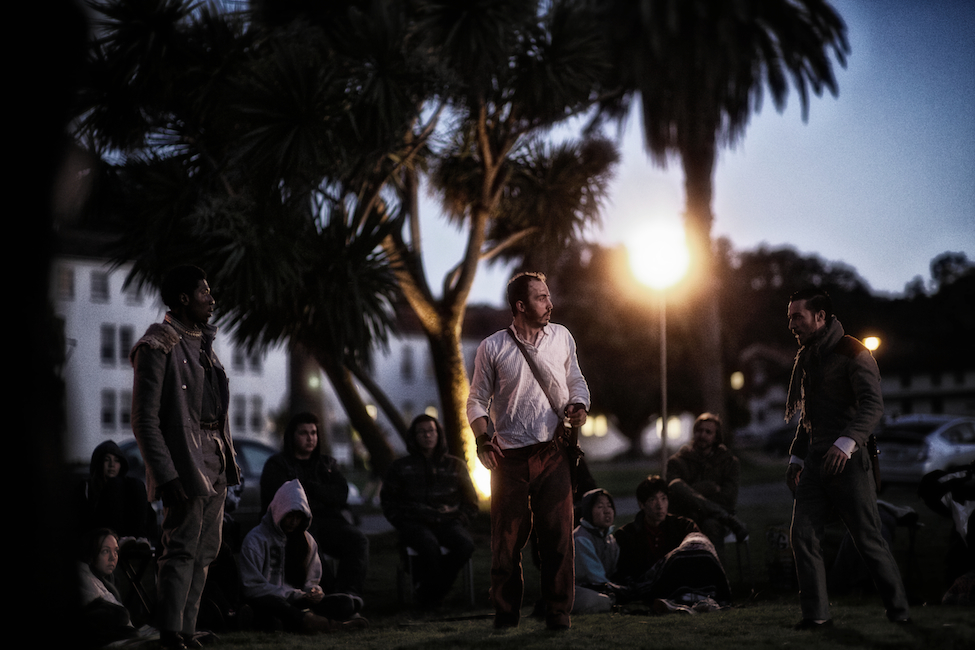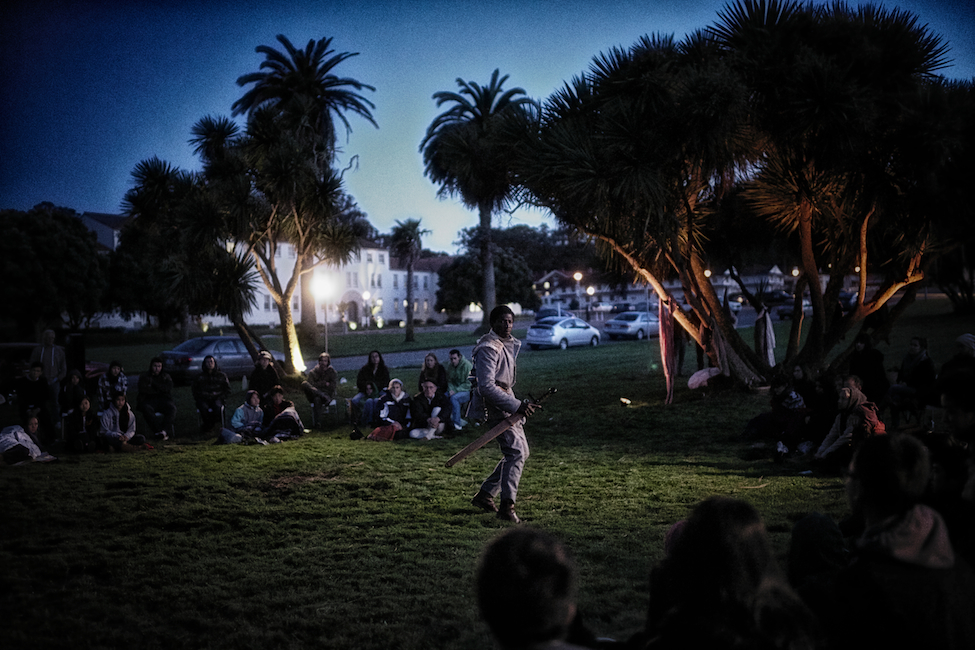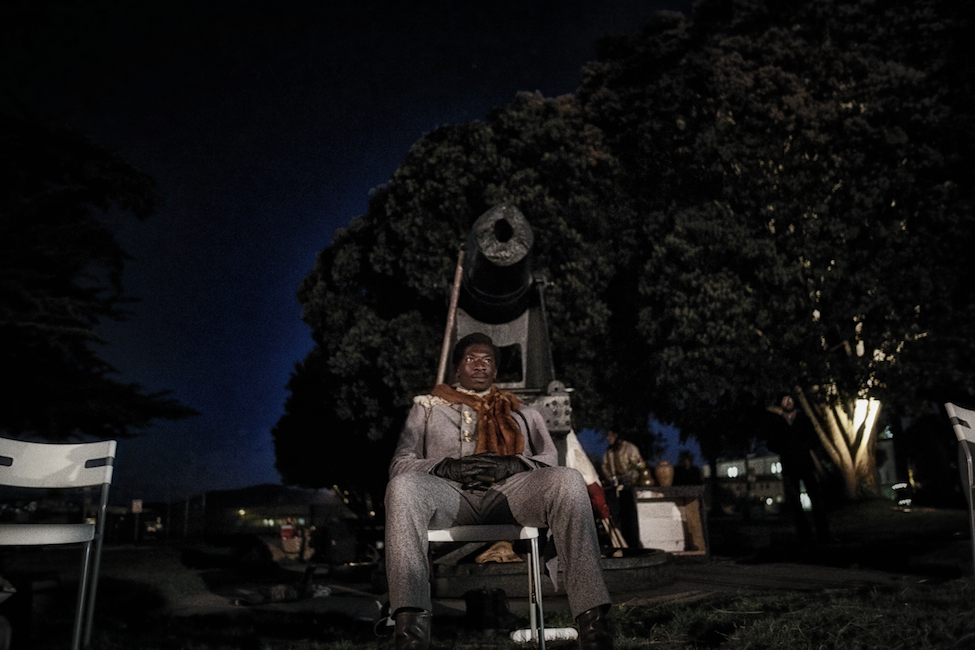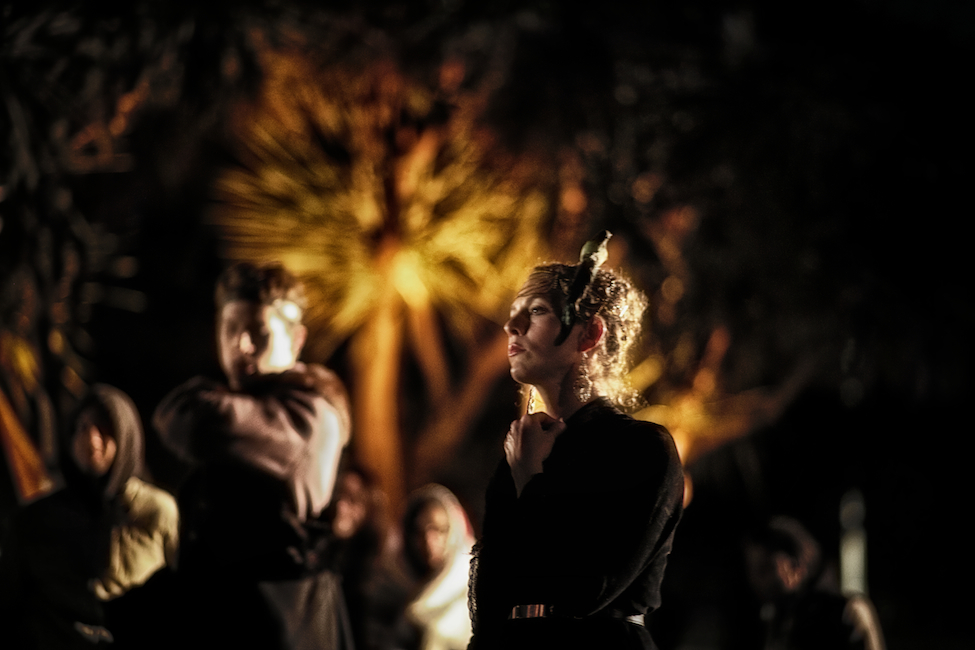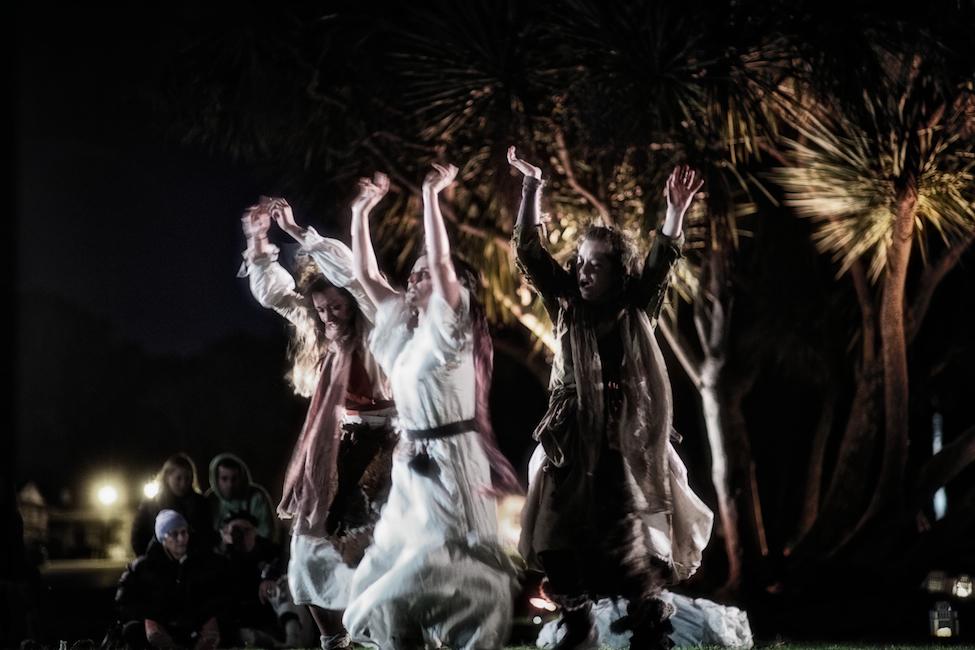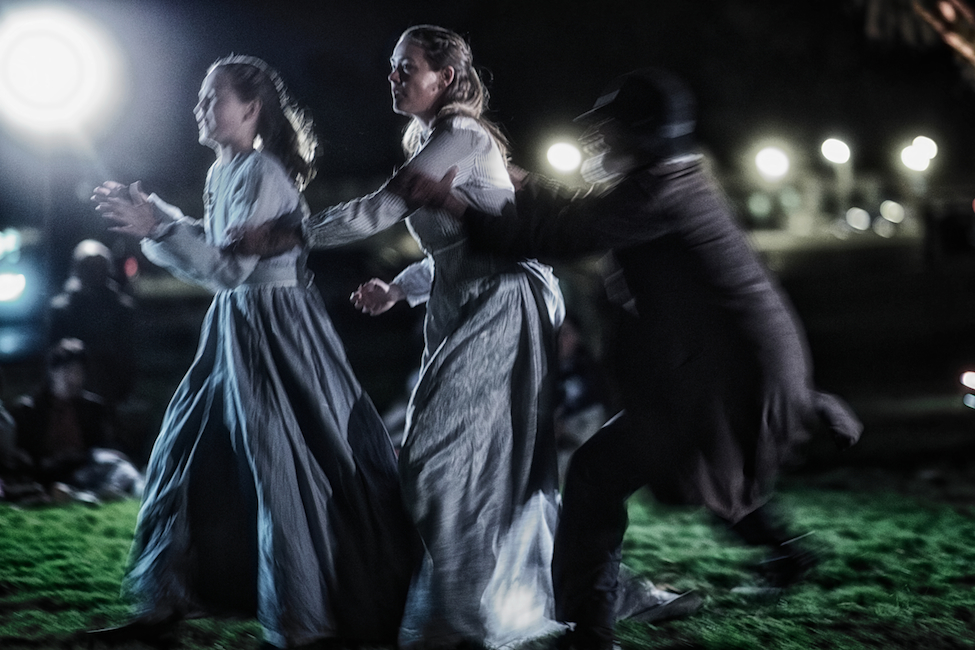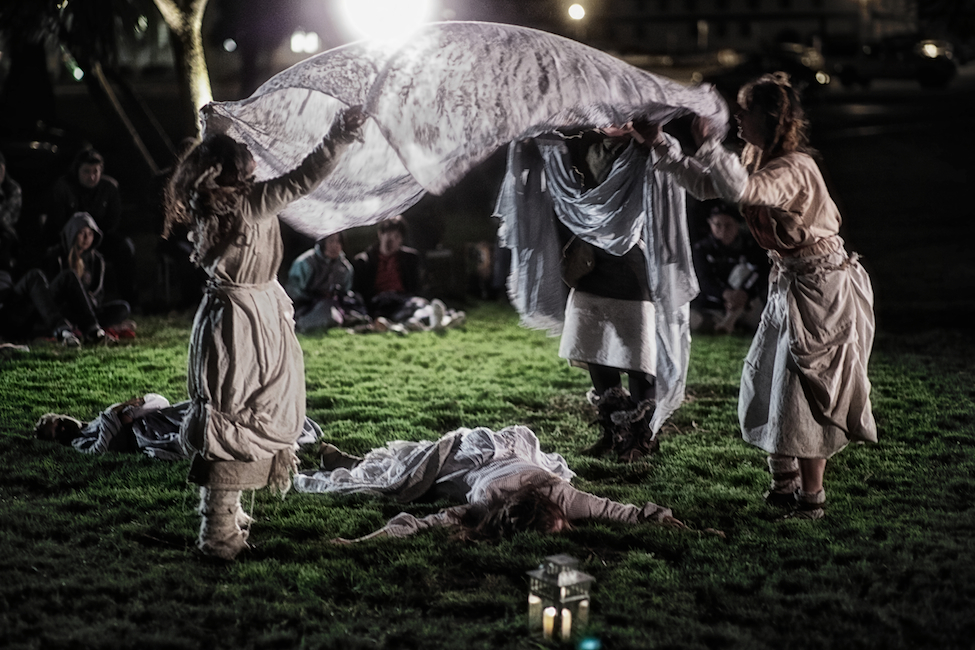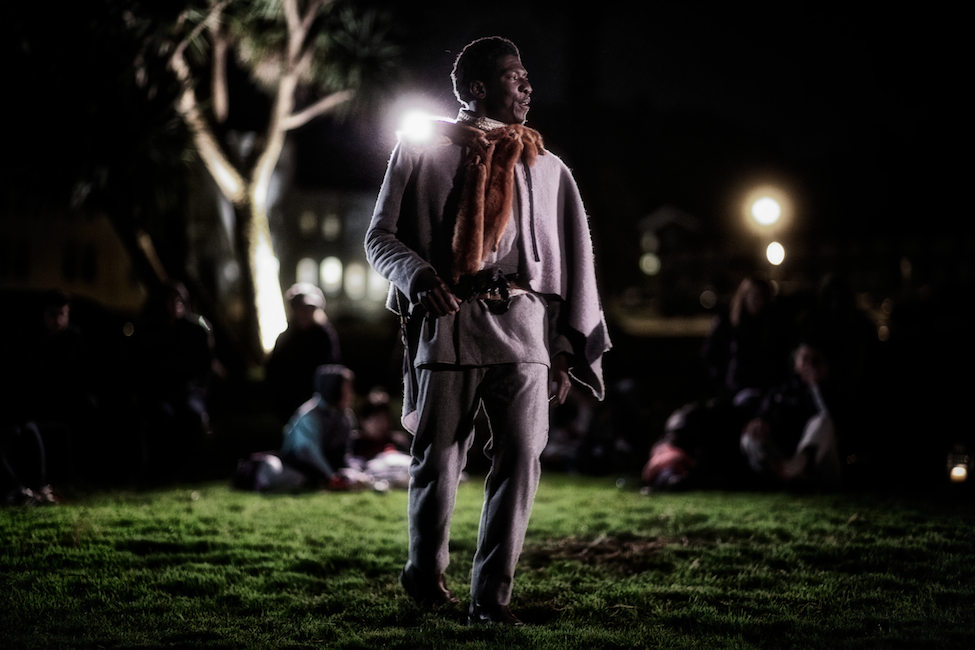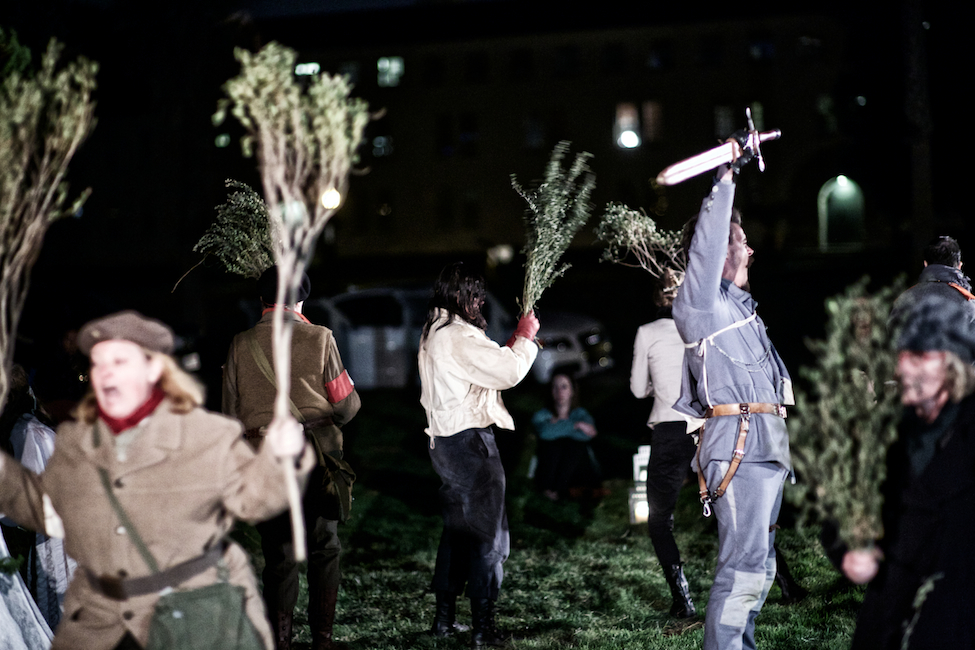We wonder what the Weird Sisters are predicting for 2014….
2014 Reflections
“We work in the dark – we do what we can – we give what we have.
Our doubt is our passion, and our passion is our task. The rest is the madness of art.” – Henry James
2014!
A quick recap: we rallied after the effects of the 2013 Government Shut Down and re-activated our stunning Macbeth at Fort Point, we brought the joyous Canciones del Mar back to the tall ship Balclutha and the provocative and entrancing Vessels for Improvisation back to the ferry boat Eureka (both vessels at Hyde Street Pier); we experimented with roving site-based performance with King Fool, our two-person distillation of King Lear, and we spent five fruitful weeks immersed in rehearsal for our sailing production of The Rime of the Ancient Mariner. Shortly before the expected opening performance of Rime on Halloween, we confronted the challenge of discerning between radically compromising the vision and honoring the core artistic integrity of the piece. We chose the latter. We trust this will lead us to a resplendent fully realized production in due time.
In just a few short months we launch our fabulous annual dinner theatre gala (February 28, save the date!) and then dive into rehearsals for our newest site-integrated colossus: a sprawling and gorgeous Ondine at Sutro. Meanwhile, as the days curl with surprising quickness into cozy darkness, and the crisper chill of autumn air carries us into cave of winter, we embrace this seasonal shift as an opportunity for reflection and envisioning what dreams may come…
In truth, this task of self-reflection is an ongoing and ever-present part of our practice within We Players. Though sometimes confusing and always challenging, to me, these questions are essential, like bread and water.
* Why make art? * What’s the core purpose? * Who is it for? * What’s the intention of a work? * Why does it matter? * What do I have to share that is truly of value? * What do I want to see more of in the world? * How can I contribute to that? * How do we achieve maximum and meaningful impact with our work? * How does our art support the expansion and elevation of the human spirit? *
This fall, as I engage with these impossible and crucial questions, I find myself peering back into the mists of spring 2000 when We Players was born, and still more questions bubble up.
* Why did I form We Players? What were my questions then? What were my intentions then?
What were the foundational inspirations and principles guiding the work then? Which are still true now? Which have changed? What have I forgotten that is still essential and must be remembered? Why site-specific work? Why participatory? Why Shakespeare? What’s the role of ritual in making theatre? Why We Players?
Through these questions we continually stretch and strengthen our established practice (our methodologies, intentions, aesthetic and purpose), which enlivens public place, challenges the intellect, stretches the capacity for feeling and empathy, and elevates the spirit.
2015 is just around the bend! In addition to Ondine at Sutro in the spring, we’ll be opening the first of several visual art exhibitions at the SF Maritime Museum in February, sharing a series of dynamic presentations at the newly opened Officer’s Club in the Presidio throughout the year, and announcing a still-secret smaller scale work at a surprise location in the fall.
I look forward to sharing with you thrilling performances, rich with moments of shocking beauty, charged with vital questions and bright with both expansive natural vistas and the radiance of the human spirit.
xo
Ava Roy
Artistic Director, We Players
A Reflection: The (mis)fortunes of Lady Macbeth
Backstage one more time, hovering in my special scorpions bedchamber, in my black gown sitting on the edge of the bed listening to the waves crash and the musical pre-show banter and soon the conch will blow and we’ll be in it one more time…
goodnight lady macbeth
enjoy the ride
this time you really get to die, not to be reborn to do it again tomorrow
tonight you go to bed
get some sleepe.
Every show leaves it’s own particular imprint on psyche and soul. With a role like Lady Macbeth, it’s imperative for me to establish a ritual, or protocol, for getting in and out of that emotional and psychological territory. Taking care to leave her at the Fort, and not to take her home with me.
The opportunity to revisit this role, particularly in such short order and alongside my closest artistic collaborator, allowed me to access a much deeper, more nuanced and specific expression in our 2014 production. The aftermath of cleansing my body of her presence is both immediate and slow. Initially, the surge of catching up with everything that’s been languishing on the back burner distracts. But there are the more subtle layers to deal with. I crave fat for weeks. Milk, cream, butter, oil – bring it! I want coconut and olive oil everywhere, on everything – on my skin, in my hair and lots in my food. Replenishing. I eat like a lumberjack for a few days.
There is an extreme physical toll in working in an environment as exposing and raw as Fort Point – with severe winds, piercing cold and penetrating dampness. And there was the series of small accidents… The shocking impact of a dagger hilt to the cheekbone mid tech rehearsal. Keep on working, now with an ice pack strapped to my face. My comrades offer their blood and flesh and bone to the work as well. Carmen, one of the nefarious murderers, gave herself a deep bruise literally the size of her hand…from smashing the baby’s head too damn hard in the Macduff family scene one night.
(By the way, the baby’s head was a rutabaga. We have experimented with a variety of vegetables seeking the optimal head cracking sound. Onions have a nice thud and squish, but they stink like…well onions. Undeniably and unavoidably so. Acorn squash and butternut squash are nice, but none of the squash family come close to the horrible satisfaction of the rutabaga. Rutabaga, I don’t know who eats you. But you are a wonderful prop for stage violence.)
Then of course, the adventure of John, our Macbeth, losing his front tooth, mid-performance. This not only required his commitment to staying totally in the flow, despite the obvious shock and dismay, but in addition, a more refined attention to pronunciation – for obvious reasons. On the – ahem – second episode of flying teeth, the piercing gaze of our Maria, the attentive little witch that she is, tracked the flight of Macbeth’s tooth from her perch in the window above, scurried down into the audience, and found it.
These misfortunes seem to pile up into a great mountain when I begin enumerating…
But they can’t touch the quiet joys of moments alone in the fortress, under the full moon, or under the sunset soaked sky. The precious moments when a perfect shaft of light streams in through a thin window in a casemate otherwise submerged in perpetual darkness. The glory of private views onto the slice of solitary beach just below the fort to the west, a strip of sand untouched by human footprints. The practical and pleasurable act of steadying myself as Lady Macbeth after the torment that is the banquet scene, with a few moments in the thick shadows of a tucked away arch that is covered in sand for some reason (did it blow in through the window? why is it here on the third floor?). I press my hands into the sand canvas and remind myself I have a body.
Lady Macbeth is unraveling from the beginning, the madness doesn’t come suddenly, it’s there all along. Like a hard boiled egg that’s been cracked, but not yet peeled. The shell just holding together, despite it’s apparent wholeness. The confining leather corset and tight waisted skirts, the making of her face, the need for some physical contact with the fort walls at all times…all efforts to keep. it. together. A sense of vertigo rushes in when Lady Macbeth loses contact with the brick and veers into open space. From there she tumbles headlong into the “out damn spot” sequence. A fragile object hurtling through space, fatal impact inevitable…
After one performance, I asked a friend her impressions of the egg drop at the onset of the play. This particular audience member does not identify as a theatregoer or even as much of an art enthusiast (and is certainly not an active Shakespeare fan). I find her responses entirely authentic, not glossed with a desire to please. Among other pleasing things she describes about that cold windy night at the Fort with We Players…
“The egg drop? Oh, I don’t know what it was supposed to mean. But I guess it seemed like…”
a pause
“…an exclamation point and a question mark.”
I’d like all beginnings and endings to come close to this…
!
?
–Ava Roy
Founding Artistic Director, We Players
Encountering the Trio
Saturday July 26, 2014
at THREE o’clock
on the beach at Aquatic Park
(directly in front of the Maritime Museum building)
FREE!
You’re invited! To the first public sharing of The Trio’s practice. The women who wielded elemental powers as the Weyard Sisters in We Players recent Macbeth at Fort Point, continue their exploration of other mythical trios. Join us for a picnic on the beach at Aquatic Park and encounter The Trio between the sand and the sea.
WHERE: Find the Maritime Museum building. Find the clock on the museum facade. Face the water. The Trio is somewhere on the the beach. Meet at the red We Players flag in the sand. They’ll come to you when it’s time.
The Maritime Museum is located at the far end of Beach Street, next to Ghiradelli Square in the Fisherman’s Wharf neighborhood of San Francisco.
WHEN: 3-5pm, Saturday July 26, 2014
WHAT TO BRING/HOW TO PREPARE:
This event is free! But please do:
– Bring a picnic! We’ll have some snacks to share, please bring your own as well.
– Bring a beach towel or blanket, sunscreen and warm layers.
– Prepare to kick your shoes off! This party is in a sandbox.
WHAT ELSE:
The sharing will be immediately followed by a conversation with The Trio. We are eagerly seeking your experience! Your responses will directly inform the next iteration of our work.
The Sound and The Fury
There are only two more weeks to join for what audiences and critics are calling “an experience of a lifetime you will never forget!”
Have you seen a performance, but want to revisit the unforgettable images and sounds of Fort Point?
Have you bought your tickets for an upcoming performance, but can’t wait another minute to get into Fort Point?
Enjoy this 3-min video of Macbeth at Fort Point – story & site highlights! (video by Tracy Martin)
We Players presents Macbeth at Fort Point in San Francisco
May 30 – June 29
Film & Editing
Tracy Martin
www.tracymartinphotography.com
See what audiences and critics are saying about We Players’ site-integrated production:
“Entertaining, unnerving, powerful to experience…”
“Amazing and completely engrossing…”
“Those fortunate enough to attend this extraordinary event (it is more than a play) will be revisiting the memories for years to come.”
“The production itself was magnificent!”
“Find a way to go see We Players’ production of Macbeth at Fort Point. Scratch that – drop everything and run, run, run over and do not miss this show. The most delightful use of performance space you’ll ever experience… I ended up having more fun watching this production than I have in many, many years.”
“An experience of a lifetime you will never forget. The power of location is made clear by these performances of Macbeth at Fort Point. Don’t miss this opportunity!”
Macbeth Plot Summary
Excited to see Macbeth at Fort Point, but want to brush up on the story before you see it? Look no further!
Read on for a plot summary of Shakespeare’s tragedy brought to you by our co-directors, Ava and John.
Ancient Scotland: Macbeth, a small-time thane (chieftain), is instrumental in defeating a very powerful rebellion against the aging King Duncan. On the trek home from battle with his comrade-in-arms Banquo, three “Weird Sisters” appear and prophecy that Macbeth will be king and that Banquo will father a long line of kings. Next, Duncan promotes Macbeth for his part in the war and names his son Malcome heir to the throne. The king and his retinue will stay with the Macbeths that night on their way home from the front.
Macbeth returns to his castle ahead of the others and confides in his wife, who persuades him to kill the king. Lady Macbeth hosts a party, drugging all the guests, thus laying the groundwork for the murder. Macbeth, weary still from battle and rattled by inner turmoil, does the deed. Macduff, a powerful thane who has not spent the night, arrives in the morning to find the king dead. Macbeth, pretending vengeance, kills the king’s two bodyguards, and Malcome flees to England.
Macbeth is crowned King, but, still unable to sleep and afraid of the sisters’ prophecy, he hires two servants to kill his friend Banquo and Banquo’s son Fleance. During the muddled assassination, Fleance escapes. At another banquet, Macbeth confronts Banquo’s bloody ghost, much to the confusion of the thanes loyal to Macbeth, whose numbers are beginning to dwindle. By now, Lady Macbeth is losing her grip on sanity.
Macbeth returns to the Weird Sisters who present him with two consoling riddles: His power is safe until the forest approaches his castle and no man “born of woman” will ever threaten his life. However, Banquo’s line of kings will “stretch out to the crack of doom.” The Thane of Ross appears on the empty heath with news that Macduff has fled to England to join forces with Malcome. Macbeth, “stepped in blood so far,” orders the utter destruction of Macduff’s entire clan.
In England, Macduff pledges his support to Malcome and learns from Ross that his wife and children have been slaughtered. Aligned against the tyrant and with the support of the English forces, Macduff and Malcome lead the charge towards Dunsinane.
As overwhelming forces approach Macbeth’s castle, the crazed Lady Macbeth dies. The attacking soldiers disguise their numbers by carrying branches hacked from the forest, breach the walls and fight Macbeth’s remaining soldiers. Macduff meets Macbeth who prevails in the ensuing duel until he learns that his adversary was not “born of woman” but was “from his mother’s womb untimely ripp’d!” Macbeth loses his head and young Malcome is crowned the new King of Scotland.
— Ava Roy & John Hadden, Co-Directors of Macbeth at Fort Point 2014
The Weyard Sisters Trio
An inside look at We Players’, The Trio, three women who have worked together for over a year and a half developing their dynamic. The result: A bewitching, mesmerizing portrayal of the Weyard Sisters in Macbeth at Fort Point 2014
When Ava gathered a small group of actors to brew work in the off season – that’s the time when We Players is not working to put on a full production – Maria, Julie and I showed up. Ava brought in the concept of working with Classical trios of women to fit our trio of actors. We went away and researched furiously and then came back to share the sordid details of these mythical women, salivating with the same rapturous delight that many people experience watching an episode of Game of Thrones. The Furies, who sprung from a drop of blood, avenge crimes against nature by causing tormenting madness or illness, their wrath placated only by ritual atonement and purification. When the Furies are not angered, they are known as the Fates, a Maiden, Mother and crone who sit together spinning, weaving and cutting under the trees of life. Their yarn is not of ordinary material: it is the measure of one individual life, and when they have cut it… your time is up. These are just two of the trios that we explored, putting them in our bodies, using various materials for them to play with, and wondering how they exist today. And one day, Ava had the revelation: “You three are the Witches for Macbeth!” The foundation was already laid to work with the Weyard Sisters who are the interpreters of the natural forces, who deliver the fateful message to Macbeth about his future success, and who let him know when he has gone against the natural order. We had already done half the work for the three sisters by trying on the many archetypal aspects of their trio! Layered in to the Witches that you see in Macbeth are many other powerful and time worn women. Time to get out the book of classical mythology? Or take a gander on Google? I hope you take the time to enjoy some of these stories, and come see one incarnation in our production of Macbeth at Fort Point in June 2014.
-Caroline Parsons
Wart covered and haggish stirring the steaming cauldron. Cartoons of female power. This is not what we saw, we sisters, we Weyard Sisters. Connected as kin, as different as individuals. We’ve become sisters through expeditions in myth, archetype, stereotype, connection, polarities, the natural, the supernatural, trust, tension, locomotion, stillness, power, and vulnerability. Drawn into the tornado that is Macbeth to find these sisters, these forces of nature that truth-tell, witness and cycle as seasons. Creation is messy, imperfect and filled with sweet dissatisfaction that drives. As we weave our web gets stronger, more intricate, more layered. We return to what we’ve learned and search for the unknown. Spinning back into these Weyard Sisters once again to follow the trail of their complexity and simplicity. The history of all our sister trios at our back awakening us to the promise of what’s to come.
-Julie Douglas
Our work in Macbeth is so deeply informed by our trio work that to try to follow the thread of creation back to its beginning is virtually impossible. So, I’m offering some fibers that seem meaningful to me:
TIME: We have gotten to know one another as artists and a people over the course of years and hundreds of hours of rehearsals. We have lived together, eaten together, laughed and cried together. We have had the luxury of being able to build and refine our ideas over time and they have had time to sink from the surface into our very bones.
SISTERHOOD: We experience the best of this relationship and some of its challenges. Sometimes we are impenetrably unified and sometimes we struggle to be seen and heard as individuals. We love and support one another fiercely but we also disagree and find compromise. And we usually know what the others are thinking without anyone having to say a word.
THE NATURAL WORLD: We have spend at least a portion of every gathering exploring an element of the natural world, whether it be experiencing, engaging with and relating to a field trip location, or working with collected plants, wool, or food. Connecting with these natural elements connects us both to our past through following in the footsteps of ancestors who have used these elements and to what might be as we find imaginative ways to interact with these elements and forge our own personal connections that we will carry with us through Macbeth and beyond.
-Maria Leigh
More Than Blood & Gore
Working the final showdown between Macbeth and Macduff last night at the Popell's, my wonderful hosts (and We Players supporters–Andy is Board President): Their son Isaac meets us with his own nerf swords and shows us a thing or two in an impromptu hackfest. It’s a good thing our thanes don’t have Isaac to contend with! As we go to work in the evening light, Isaac sets himself up with popcorn and blankets and a big comfy chair behind a plate glass window to watch us work outside in the courtyard.
We begin with swords made of pvc and foam pipe insulation, light and relatively harmless, going through each move, each impulse, very slowly, stopping to fix anything that feels uncertain or unmotivated, and speed it up by degrees, eventually switching over to the broadswords made of steel.
My father loved the phrase “Lay on, Macduff!” It was one of a small collection of phrases (Life’s Like That; Goddamn Bastards; That’ll Tighten His Sphincter; Bongo, Bongo, Bongo and so on) that could serve almost any occasion. My son Reilly, who did Shakespeare with Ava Roy when they were teenagers, was a member of a Very Young Company (they ranged in age from 4-7 when it began) that played every year to hundreds of amazed adults after the mainstage show, outdoors at the Mount, the home of the young Shakespeare & Co–and the only scene they never missed was the beheading of Macbeth.
“Turn, Hellhound, Turn!”
Violence is great for getting audiences. Every action film producer knows this, as did the King’s Players in 1600. But Shakespeare always wants to know what’s under the surface. What led to this? How can we find out more about a character from the way he or she dies? Shakespeare knows that when the audience is at their most focused it is a good time to throw some curve balls about the riddle of the human psyche–and the moment of death is one last chance to find out after all what is going on here!
In Shakespeare, death and violence are marked and felt. Ava is really good at underscoring this in her work with the Weyard Sisters, for instance, who are always super aware of each death and always mark it in some ritualized way.
Our colleague, Jamie Lyons, was watching us work on the scene in which, to convince her husband against his will to kill the King, for whom she seems to feel some terrible ancient hatred, Lady Macbeth enacts the killing of her own innocent baby. She is very specific in these few lines:
“I have given suck and know
How tender ’tis to love the babe that milks me-
I would, while it was smiling in my face,
Have pluck’d my nipple from his boneless gums
And dash’d the brains out had I so sworn as you
Have done to this.”
She knows what she is talking about; she’s nursed a male baby. Her own, presumably. It’s one of the mysteries of the play. In our version, she enacts the sequence physically, giving suck, plucking him away from her breast and smashing his invisible head against the stone courtyard floor. She hits a nerve; the next thing we know, Macbeth is “settled” to do the terrible deed.
When the murderers kill Lady Macduff and her fine, intelligent child, we have them also smashing her baby in the same way that we have seen Lady Macbeth mime the act in the earlier scene.
Jamie suggested that one of the Weyard Sisters could come and somehow sanctify the spot on the ground where the invisible baby is killed, after the scene’s end. And so it goes, bit by bit, we all participate in stringing these moments, images, experiences into a fabric that, if we’re diligent and lucky, hang together and give us more than blood and gore.
— John Hadden
Associate Artist and Co-director of Macbeth at Fort Point, 2014
Macbeth at Fort Point 2014: The First Rehearsal
I awoke the morning of Friday, April 25th to rain. Sheets of late, overdue rain which our earth and reservoirs are sorely thirsting for. This is also the day of our first full cast rehearsal on-site at Fort Point. And so, in addition to packing the regular warm layers – hat, scarf and gloves necessary for a day at the Fort – I grabbed my waterproof boots and rain jacket as well. We Players embraces the unpredictable power of the elements, and work with equal vigor in the easeful sunshine or in the rain and cold.
Our group gathers just before the rangers open the gates to the fortress at 10am. We file in and mount the three flights of stairs to our green room, where we circle and check-in with each other, reviewing basic rules of working at an NPS site, as well as where props and costumes live, where We Players famous snack bin will be kept, and who among us are trained as first responders. Physical safety is a serious consideration for us, as we work in potentially hazardous environments and our work is athletic and physically embedded into the space. At Fort Point our main concerns are the slippery stairs and stones, which are very nearly always wet, thanks to the fog that condenses there daily, as well as the unlit corridors and shadowy corners we must navigate, sometimes while moving quite quickly.
We return to the Parade Ground to begin our walk-through of the performance route. Along the way, we identify our hidden storage locations, the pathways actors may take secretly during performance and primarily, mark the route the audience takes through the journey of the play. We gather again in the dark northwest corner of the third floor, a shaft of light filters in through the narrow window speckled with red lichen. We move through a series of exercises intended to help us awaken our senses (particularly beyond the dominant sense of sight), and to connect physically and energetically with the fortress. We move slowly at first, and without words. Eventually, character personalities begin to emerge, as do dissected lines of text. We explore, still mostly without words, how we interact with each other, with the multitude of sharp right angles, and with the negative spaces.
We take particular note of the lack of feminine energy in the structure itself – the cold, the thick, the sharp, the angular, the imposing, the powerful fortress of brick and stone lines. And yet, Nature persists. She creeps in through the cracks and pours into the open mouth of the fortress from above. The rain pools in the corners of the Parade Ground and the wind describes subtle and softly shifting patterns on the surface of these pools. The intensely bright green, orange and silver lichens grow profusely on the brick walls and form soft clusters of gentle but tenacious life.
We emerge dusted with red powder from the brick and share what we collected. In a way, this kind of sense work is very simple. But by taking the time to engage in this way, not driven by intellect or idea (or worse, concept), we begin to discover our characters. A process more of rooting, tracking and revealing that deciding and inventing.
“And with the upward rise, and with the vastness grow…”
-Ava Roy, Co-director of Macbeth at Fort Point 2014
Dangerous Folly
“I am in this earthly world: where to do harm is often laudable, to do good sometime accounted dangerous folly.” - Macbeth, Act IV, Scene II.
Join for what critics have hailed “a delicious sensory overload that is a close encounter of the best kind.”: MACBETH AT FORT POINT
Ava & Lauren Announce Macbeth at Fort Point 2014 (video)
Artist Director Ava Roy and Managing Director Lauren Chavez talk about We Players upcoming production of Macbeth at Fort Point opening June 5th.
Macbeth at Fort Point (2013): Installations
Macbeth at Fort Point (2013) Video Clip
A glimpse into the madness… Lady Macbeth (Ava Roy) and the Weyard Sisters (Julie Douglas, Caroline Parsons, Maria Leigh). Macbeth 2013.
Join us for the highly-anticipated remount production of Macbeth at Fort Point this spring.
‘The Bold Italic’ Interview
Local journalist and writer, Daniel Hirsch, interviews Artistic Director, Ava Roy, about We Players’ upcoming production of Macbeth at Fort Point 2014. Read on!
The Next Experimental Performance to Sell Out ASAP
by Daniel Hirsch, The Bold Italic
Dark clouds gathered over theater company We Players 2013 production of Shakespeare’s Macbeth — and that was perfect. The company specializes in “site-integrated” performances in which they stage classical productions in outdoor landmarks and historical sites. Since 2009, We Players has partnered with the National Parks Service to produce Hamlet on Alcatraz and an adaption of The Odyssey on Angel Island, among other productions. To mount its version of Macbeth, We Players selected Civil War-era fortress Fort Point under the Golden Gate Bridge. For a tale of power struggles and dark forces that take place in the tumultuous, rainy Scottish highlands, the foreboding weather was icing on a cake already rich with atmospherics.
But metaphoric dark clouds were also brewing—in Washington, DC. Midway through We Player’s sold-out run, the government shutdown forced the company to cancel several of its performances because Fort Point was suddenly inaccessible to the public. This June, We Players is remounting its successful production to both make up for the lost performances (over 1,000 ticket-holders were turned away) and to rethink Shakespeare’s dark masterpiece. It promises to take audience members all over the fort, offering chills of the emotional and physical variety.
As the company begins preparing its return to Fort Point, I interviewed Ava Roy, We Players’ artistic director who also plays Lady Macbeth, about the dark magic of this famous play, San Francisco landmarks worth loving, and government incompetency.
Macbeth is famous for being a cursed play … Theaters that presented it have burned down and actors involved in it have seen their careers ruined. Do you believe in the curse? Do you think the government shutdown was a manifestation of that curse?
[Laughs] I’m not that superstitious. The play is definitely dealing with some intense themes and energies, and I try to respect them. The government shutdown was one of the motivating factors and an initial impetus to do it again, but it [also] provides us a chance to explore the text in new ways and go deeper into the material. For example, in 2013, we cast all the warriors as very young men, exploring the theme of how boys become men as warriors. Now, we’ve cast much older actors, in their 40s, 50s, and 60s. It really changes the fundamental power structure, and political relationships in the play.
Did having to deal with the government shutdown affect the way you thought about this play at all?
It didn’t change my thinking about the play itself, but it definitely felt grossly appropriate. As much as it was painful and upsetting, it also felt like: oh my God, the government is perfectly modeling what this play is about. A lot of my goal in doing Shakespeare is about how do we make people see relevance in our present moment. I couldn’t ask for anything more perfect to demonstrate how power corrupts. People in Washington were making —or rather, not making – choices and not seeming to see or care that their actions were affecting individuals, small organizations, and communities.
Why did you choose Fort Point for Macbeth?
Physically, the space is perfect. It’s this big, brick, damp, cold fortress. In terms of thematic connection, it was built during Civil War, but it was pretty much obsolete by the time it was completed. It speaks to the futility of protection. Everything Macbeth does to protect himself is basically futile. Sonically, as well as environmentally, there’s this constant buzz and throbbing noise from the sound of cars on the bridge above, the waves outside, the wind, you can’t get away from it … from the very beginning, you get this sense you’re shot out of a gun, the play really accelerates, and you can’t escape.
What’s your relationship been like with the National Parks Service?
Since we started working with the Parks Service, they are now developing protocol for more artists to use their spaces. It’s been really great to feel like part of movement. We have a shared mission of increasing attention and relevancy to these sites … A lot of what we do attracts more local visitors to parks. After we did Hamlet at Alcatraz, a lot of longtime local audience members told me that was the first time they’d visited …When you have a powerful emotional experience in a place, it changes your relationship to the place. The larger benefit is how we can change our world and our relationship to it.
If you could stage a performance of any play at any famous landmark, natural or man-made, what would it be and why?
The truth is every where I go, I’m making a list. I’ve been cultivating this way of thinking for a long time. I’m pretty interested in Greece and Grecian ruins. The first place I’d go outside of the States would be some semi-rubble and ruin in Crete or somewhere.
Is there anything else you’d like to add?
Dress warmly if you come to Fort Point. It is really cold out there.
We Players’ 2014 production of Macbeth at Fort Point opens June 5th-29th at Fort Point. Tickets just went on sale and tend to sell out, so grab yours quickly if you want to go. Prices range from $30 for previews to $75 for Saturday nights with post-performance receptions.
Why Macbeth?
In October 2013, the dark clouds of the US government shutdown hovered over our production of Macbeth at Fort Point, forcing us to cancel numerous performances and disappoint over 1000 ticket holders. In the midst of the drama, the idea flashed through that perhaps we should simply allow this particularly alchemical relationship between play and place a continued life. After all, we had invested well over a year developing the production and it is very carefully built into the specific contours, energy, and stones of the Civil War era fortress beneath the Golden Gate Bridge. Fort Point itself is a central character, the other director, and our creative inspiration. A renewed life will allow us to share this powerful and unique performance with a wider audience, and hopefully reach some of those who were turned away last fall.
But every “remount” must be a re-development. The work must be allowed to change and therefore, to grow and deepen.
To this end, we are thrilled to announce a new cast that will include a host of We Players’ alumni and will feature John Hadden, my close collaborator and We Players’ Associate Artist, in the title role. In our 2013 rendition, John and I (co-directors on the production) were particularly interested in the story of young warriors. Boys who become men on the battlefield; their vigor, physical prowess and the dynamics of such hot blooded youth under the mantle of an older and wiser king, and a romantic match of a younger Macbeth to an older Lady Macbeth. We are deeply grateful for the excellent work done by our 2013 cast.
This year, in our upcoming 2014 production, we shift the perspective.
We will explore these dynamics of power and relationships through the lens of the “old guard”. Warriors who have engaged in battle for decades, who are older than their young wives, who are the same age as their King – and we believe this will provide us with new insights into the story. It is honor to welcome several seasoned and experienced actors to help us unpack the meanings of the text in yet new ways. Scott Phillips (our Claudius in Hamlet on Alcatraz) will play Macduff, Jack Halton (our Polonius in Hamlet on Alcatraz) will play Banquo, Steve Boss will return as both Duncan and the porter, and John Hadden will once again co-direct the production alongside me, as well as play Macbeth to my Lady Macbeth. We are also thrilled to welcome Nathaniel Justinianio (the unforgettable Zeus from our Odyssey on Angel Island) as the cruel and slippery Ross. Caroline Parsons, Julie Douglas and Maria Leigh will continue their work as the three weird sisters. These women truly act as the nucleus of our production. The trio began working nearly 8 months in advance of our 2013 rehearsal process; developing a profound sense of unity, deft abilities with non-verbal communication, as well as curious explorations of different energetic “states” and of ritual. These “weird sisters” have already begun to revisit their early source work to both reinvigorate their connection and to deepen their work in the 2014 production of Macbeth at Fort Point. We Players’ large-scale productions tend to be so complex that a incredible amount of time is spent negotiating the pathways through the space – both those of the audience (or multiple audience routes as the case may be), and that of each actor maneuvering through the site. The logistics of working in large sites and with the federal government, as well as the impact of severe weather conditions (it is extremely cold, windy and wet with fog at the Fort) is intense. With the route and overall design of the production already developed, we are curious what new dimensions we may be able to expand into.
We are eager to dive even deeper into the richness of the text, the subtleties of the relationships between characters, and to search for further nuance in the language and in our connection with the very stones of the fortress.
-Ava Roy Artistic Director, We Players Director, Macbeth at Fort Point 2014
‘Apparations’ Macbeth at Fort Point
Ava on West Coast Live
KQED: The Government Shuts Down Art in San Francisco
"Lauren Chavez, of the We Players theater group, had to send this message to ticket holders, who still don’t know where or if the show will go on: “Our current production of Macbeth is built very carefully and conscientiously into Fort Point, the Civil War era fortress beneath the Golden Gate Bridge. For over a year we have been integrating our work into that unique physical, sonic and energetic landscape. Because of the government shutdown we have been blocked from our stage, our most prominent scene partner and creative inspiration.”" Read More










